Charles E W Bean, Diaries, AWM38 3DRL 606/1/1 - October - December 1914 - Part 10
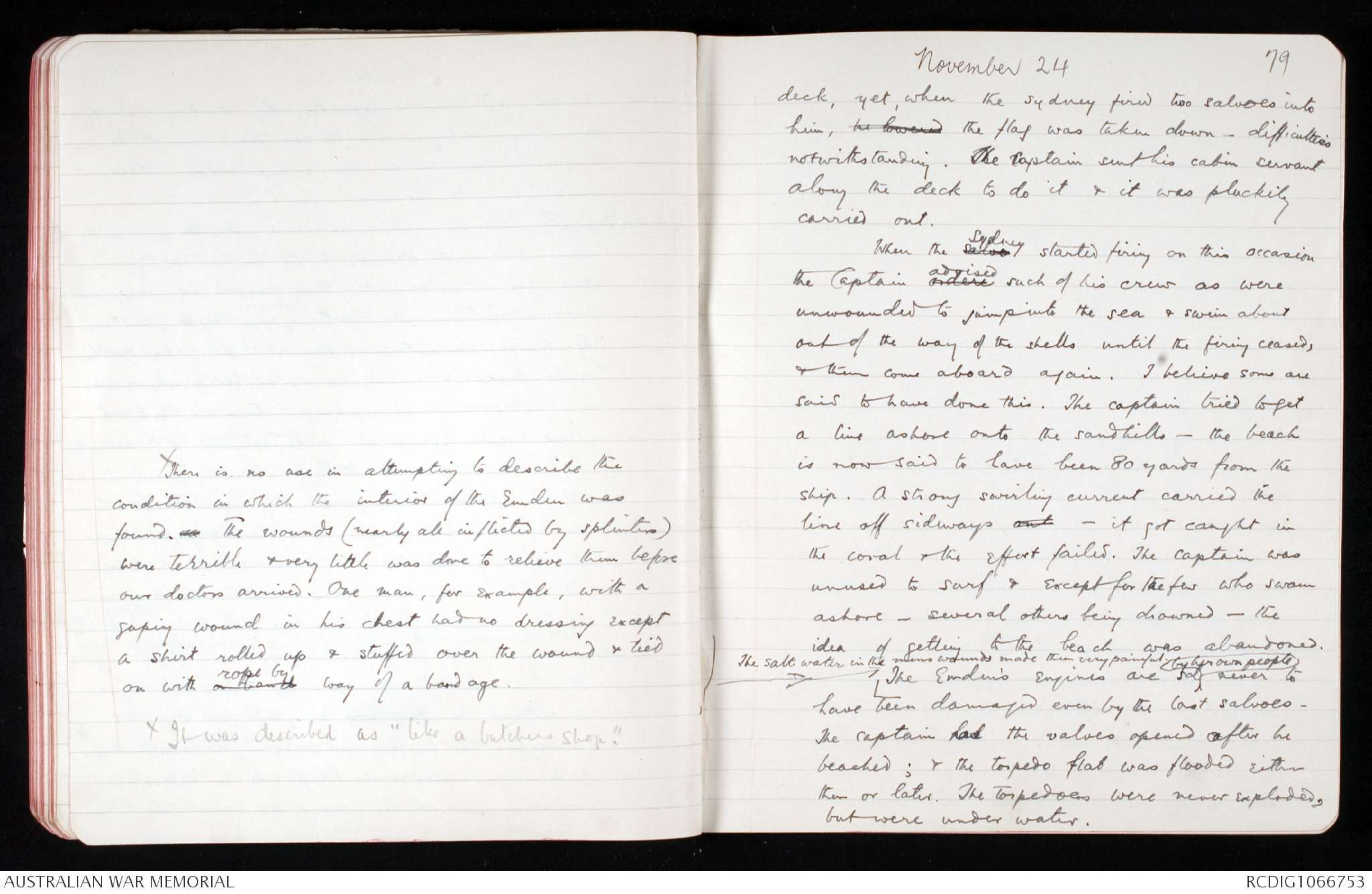
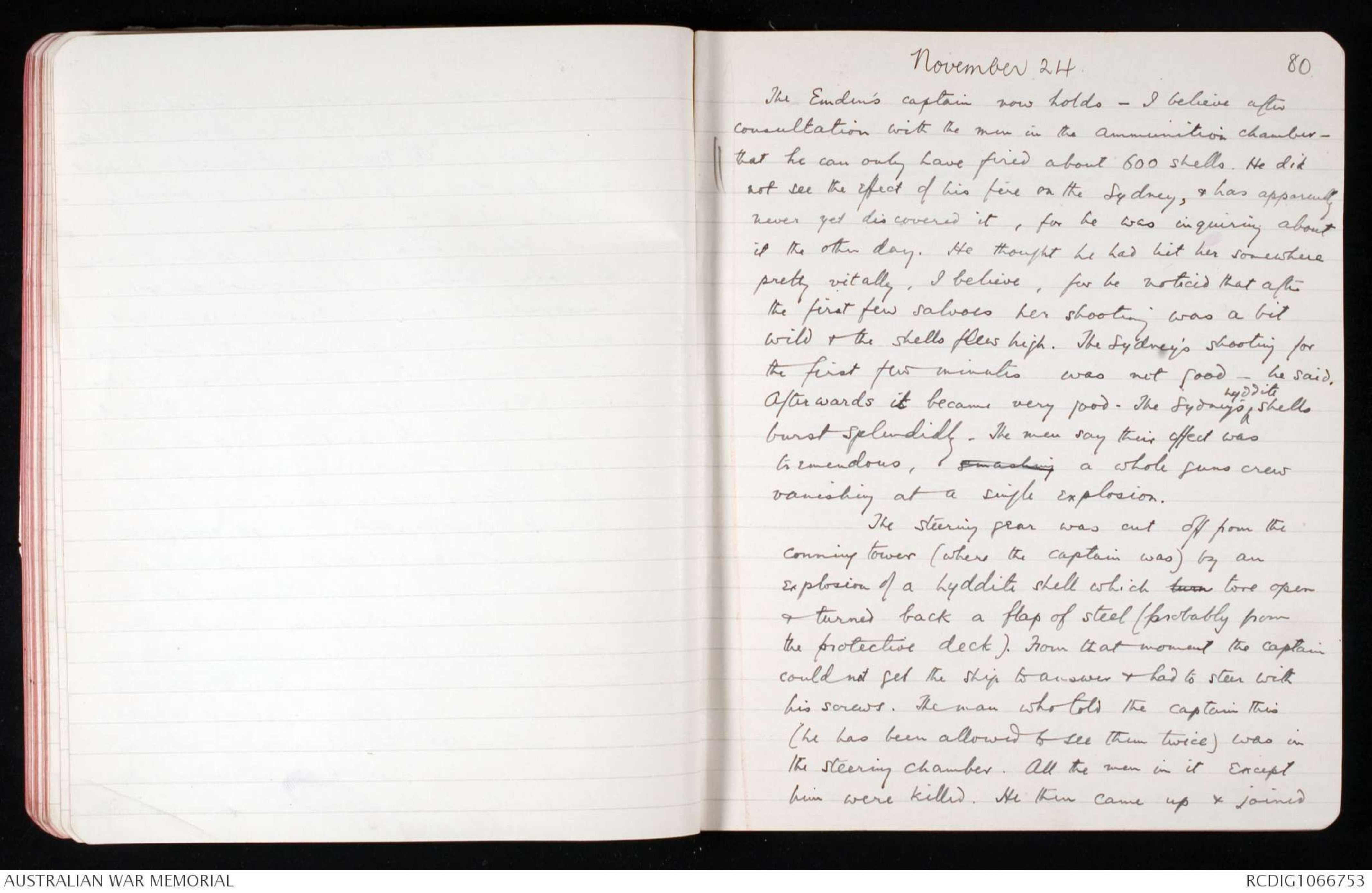
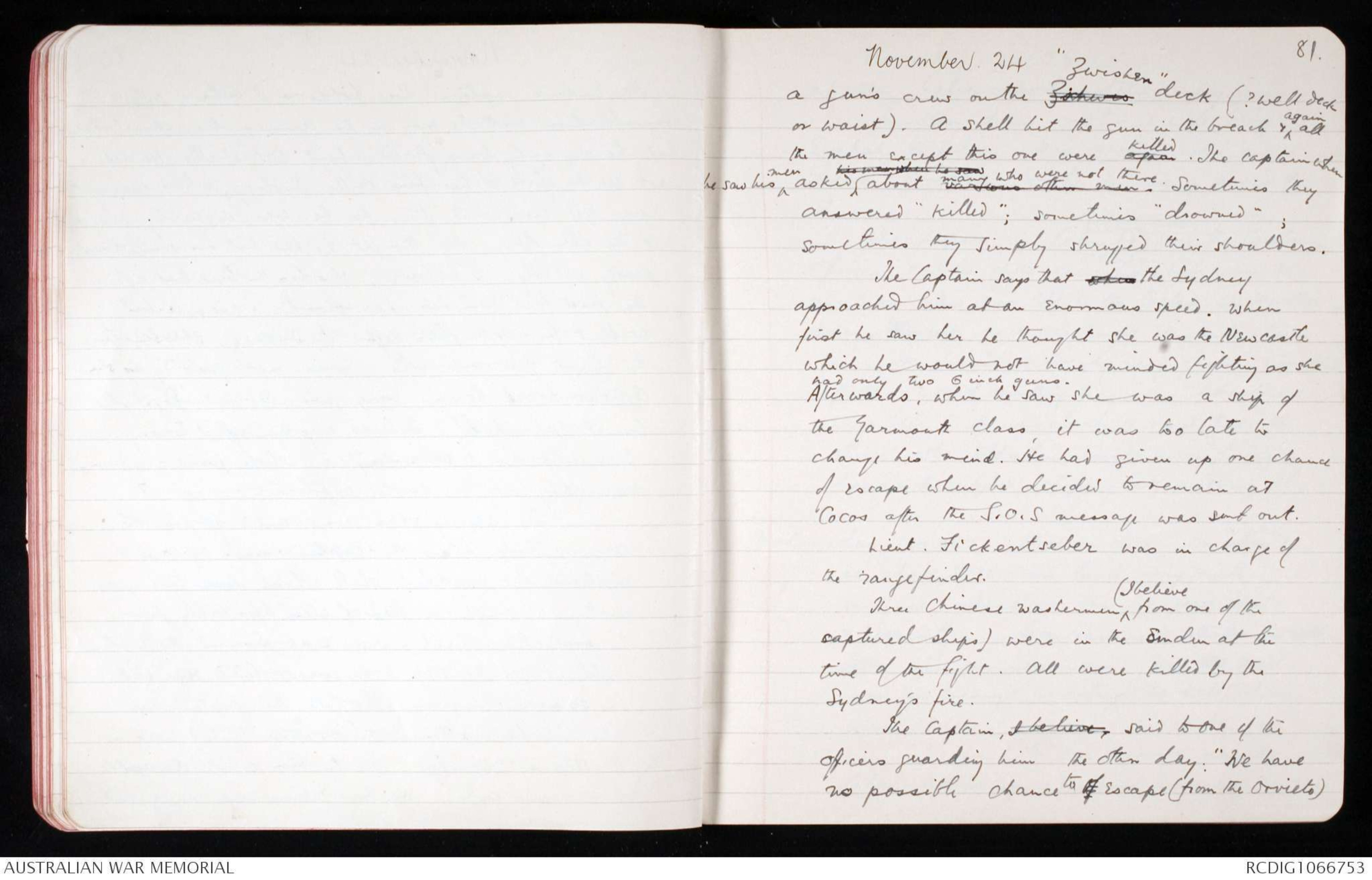
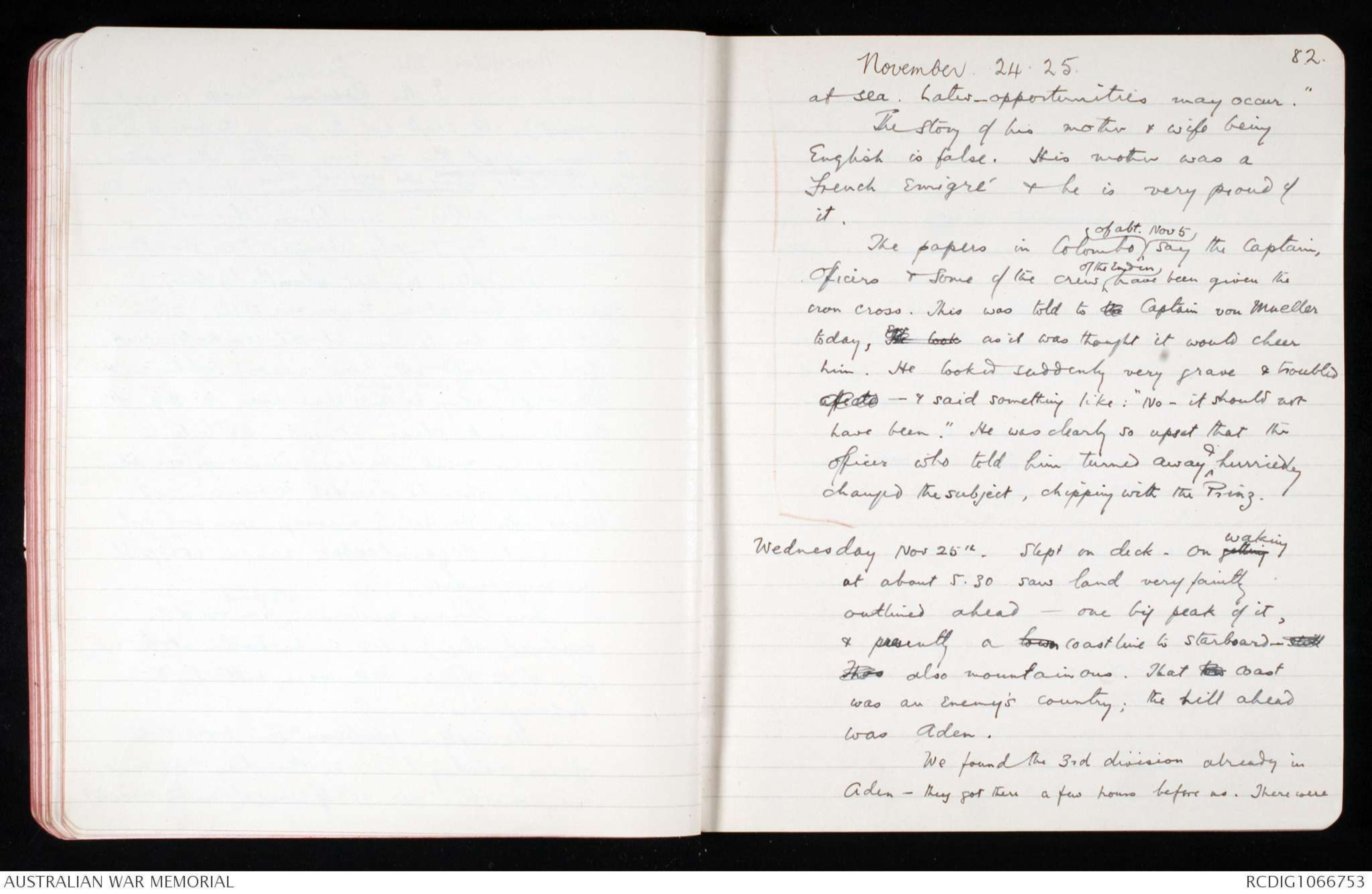
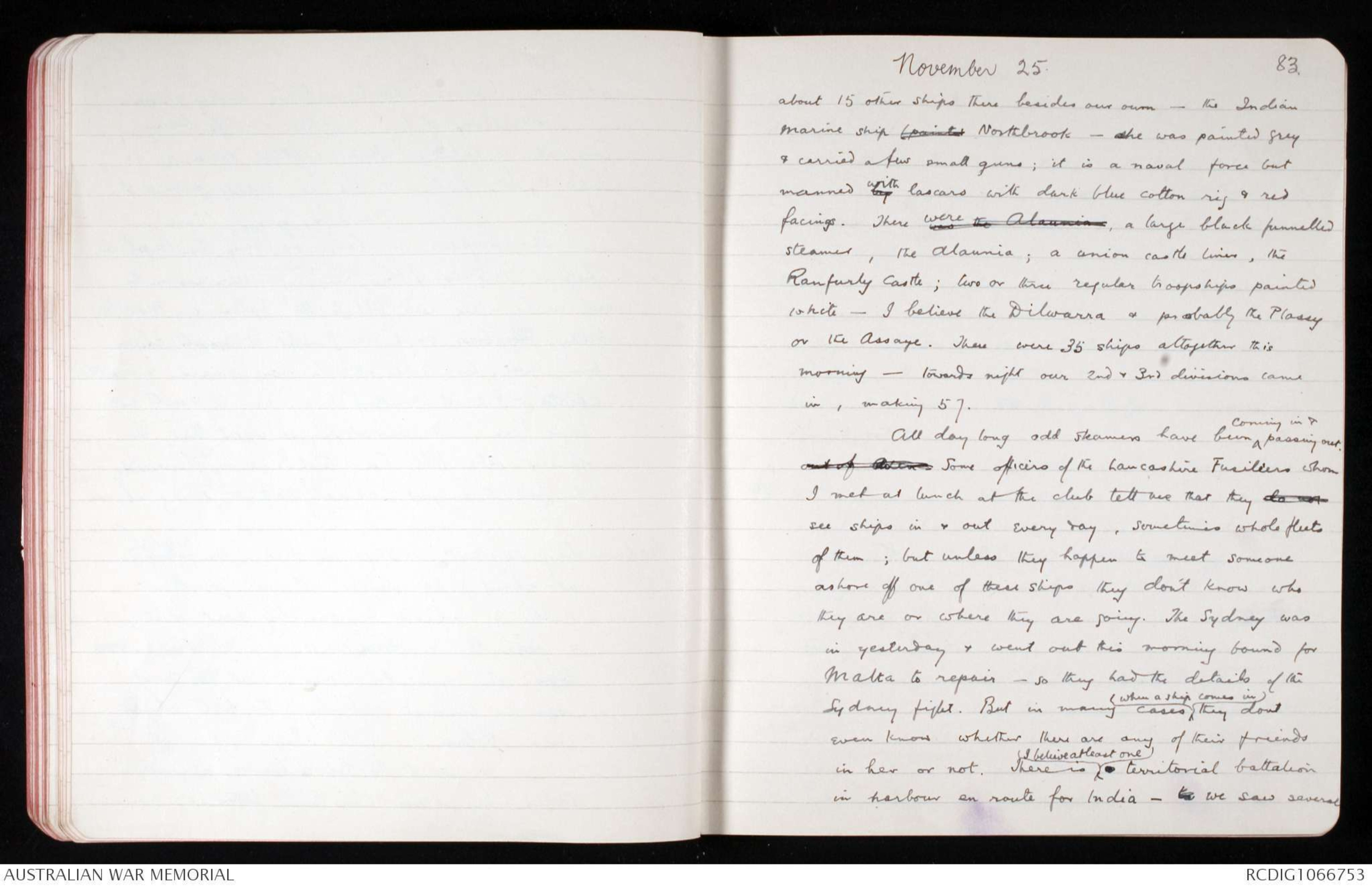
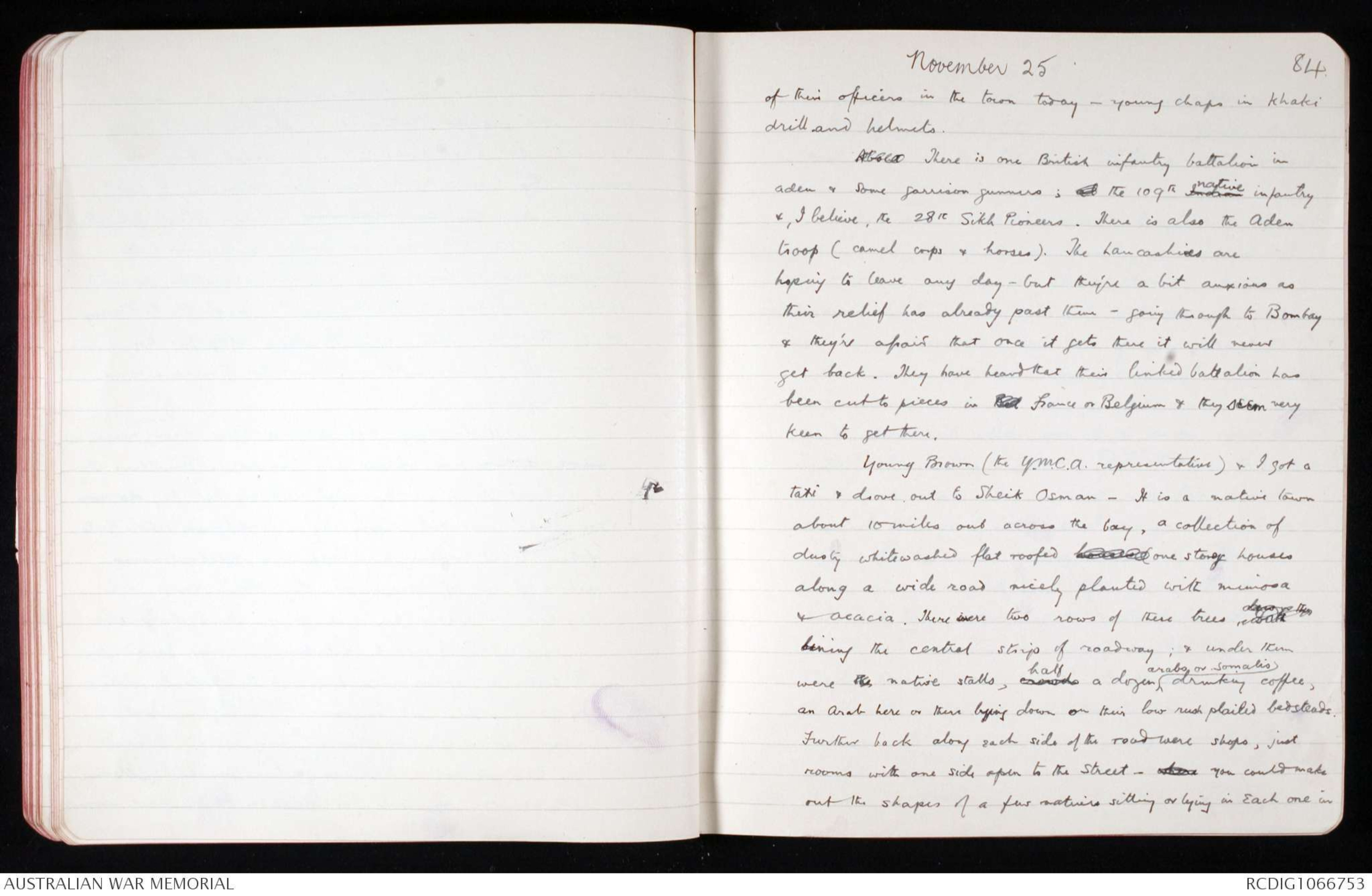
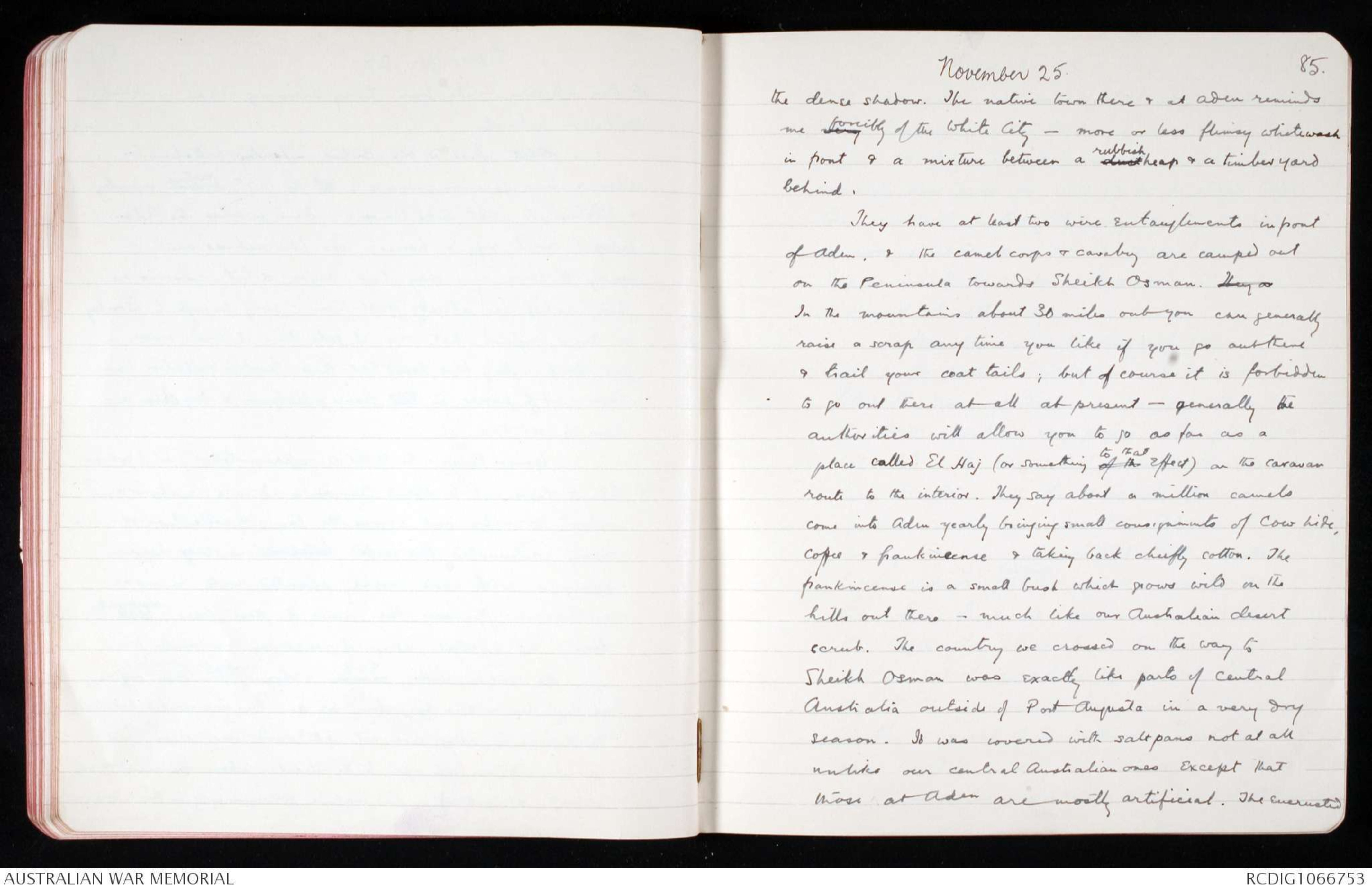
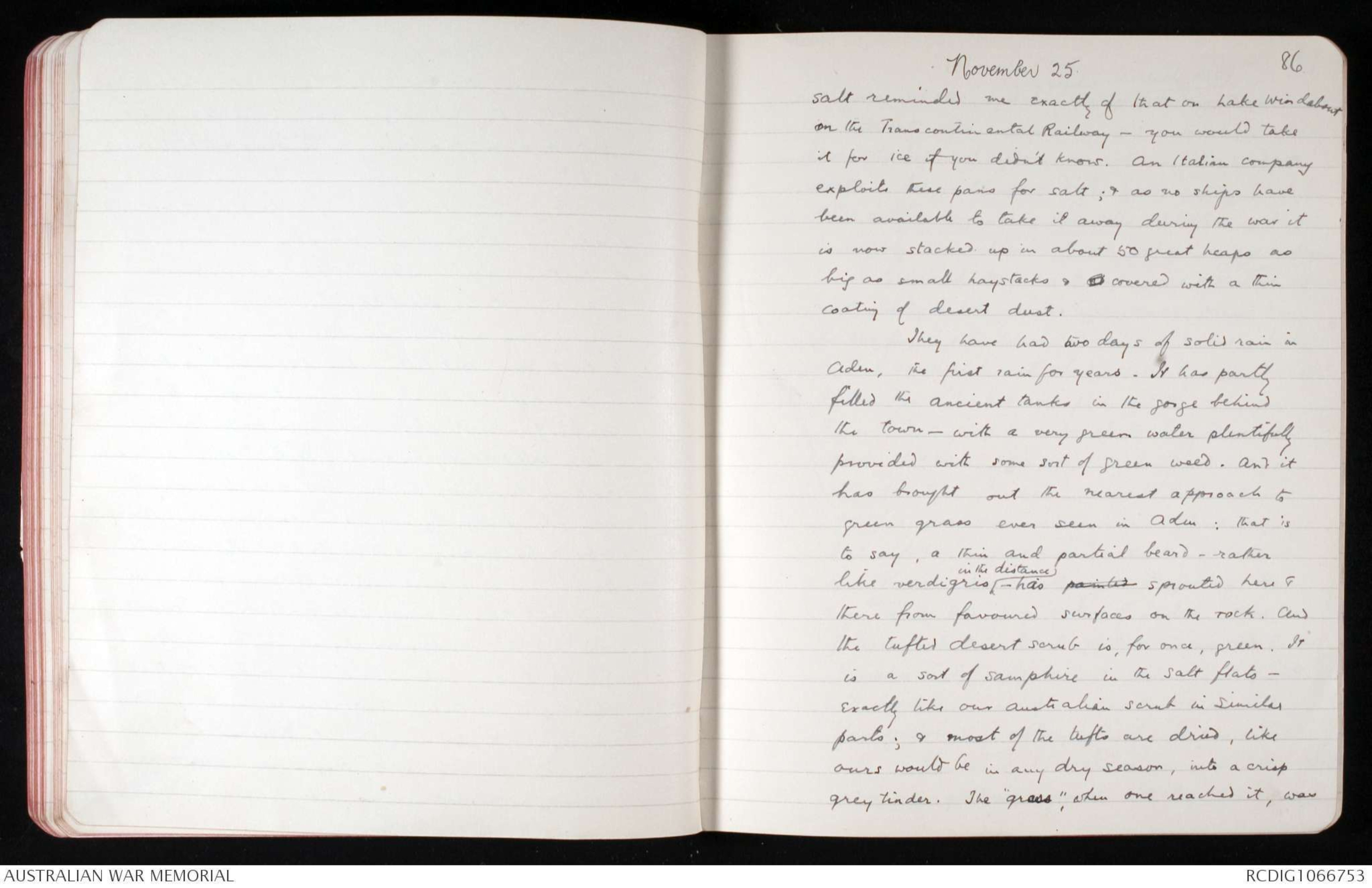
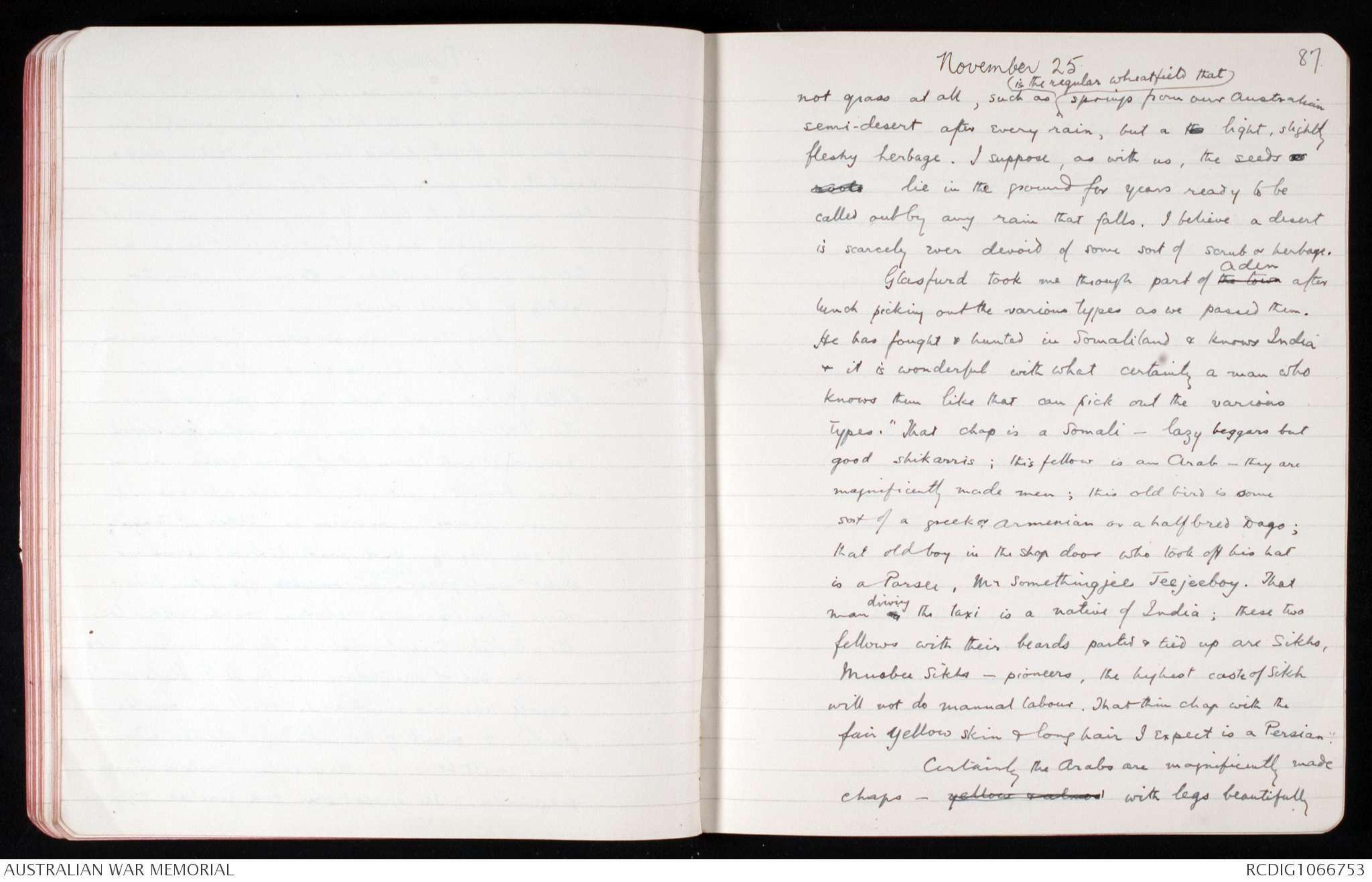
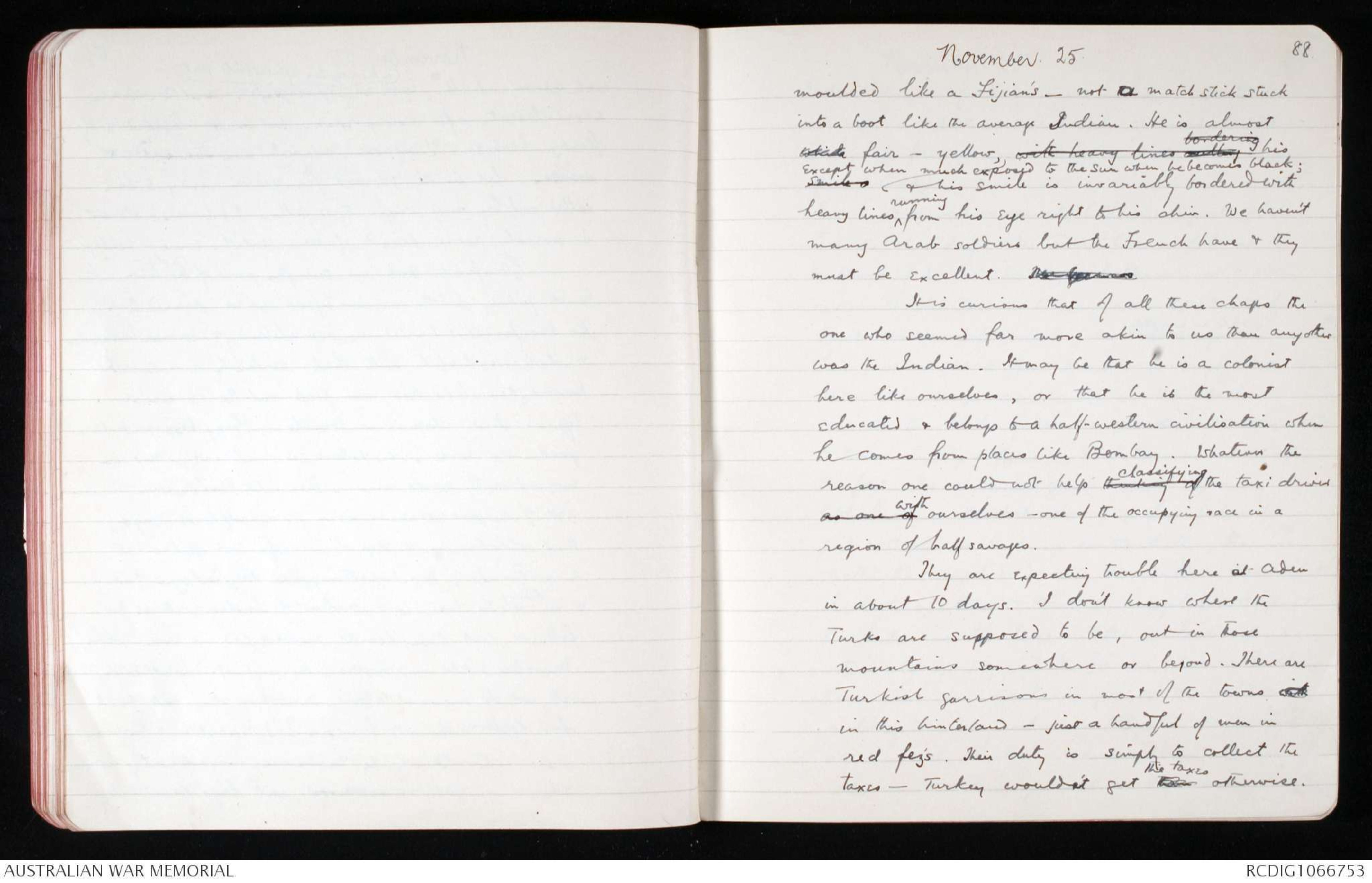
*There is no use in attempting to describe the
condition in which the interior of the Emden was
found. xx The wounds (nearly all inflicted by splinters)
were terrible & very little was done to relieve them before
our doctors arrived. One man, for example, with a
gaping wound in his chest had no dressing except
a shirt rolled up & stuffed over the wound & tied
on with rope by or banda way of a bandage.
*It was described as "like a butchers shop."
November 24 79
deck, yet, when the Sydney fired two salvoes into
him, he lowered the flag was taken down – difficulties
notwithstanding. The captain sent his cabin servant
along the deck to do it & it was pluckily
carried out.
When the salvo Sydney started firing on this occasion
the Captain ordere advised such of his crew as were
unwounded to jump into the sea & swim about
out of the way of the shells until the firing ceased,
& then come aboard again. I believe some are
said to have done this. The captain tried to get
a line ashore onto the sand hills - the beach
is now said to have been 80 yards from the
ship. A strong swirling current carried the
line off sideways out - it got caught in
the coral & the effort failed. The captain was
unused to surf & except for the few who swam
ashore - several others being drowned - the
idea of getting to the beach was abandoned.
The salt water in the men's wounds made them very painful.
←
The Emden's engines are sd ^by her own people never to
have been damaged even by the last salvoes -
The captain had the valves opened after he
beached; & the torpedo flat was flooded either
then or later. The torpedoes were never exploded,
but were under water.
November 24 80
The Emden's captain now holds - I believe after
consultation with the men in the ammunition chamber-
that he can only have fired about 600 shells. He did
not see the effect of his fire on the Sydney, & has apparently
never yet discovered it, for he was inquiring about
it the other day. He thought he had hit her somewhere
pretty vitally, I believe, for he noticed that after
the first few salvoes her shooting was a bit
wild & the shells flew high. The Sydney's shooting for
the first few minutes was not good – he said.
Afterwards it became very good. The Sydney's ^Lyddite shells
burst splendidly. The men say their effect was
tremendous, smashing a whole guns crew
vanishing at a single explosion.
The steering gear was cut off from the
conning tower (where the captain was) by an
explosion of a Lyddite shell which torn tore open
& turned back a flap of steel (probably from
the protective deck). From that moment the captain
could not get the ship to answer & had to steer with
his screws. The man who told the captain this
(he has been allowed to see them twice) was in
the steering chamber. All the men in it except
him were killed. He then came up & joined
November. 24 81.
a gun's crew on the Zichwes "Zwishen" deck (? well deck
or waist). A shell hit the gun in the breach & ^again all
the men except this one were agai killed. The captain when
he saw his ^men asked ^his men who he saw about various other men. many who were not there. Sometimes they
answered "killed"; sometimes "drowned";
sometimes they simply shrugged their shoulders.
The Captain says that when the Sydney
approached him at an enormous speed. When
first he saw her he thought she was the Newcastle
which he would not have minded fighting as she
had only, two 6 inch guns.
Afterwards, when he saw she was a ship of
the Garmonth class, it was too late to
change his mind. He had given up one chance
of escape when he decided to remain at
Cocos after the S.O.S message was sent out.
Lieut. Fickentseber was in charge of
the rangefinder.
Three Chinese washermen ^(I believe, from one of the
captured ships) were in the Emden at the
time of the fight. All were killed by the
Sydney's fire.
The Captain, I believe, said to one of the
officers guarding him the other day. "We have
no possible chance to of escape (from the Orvieto)
November. 24 . 25 82.
at sea. Later - opportunities may occur."
The story of his mother & wife being
English is false. His mother was a
French Emigrě & he is very proud of
it.
The papers in Colombo ^of abt. Nov 5 say the Captain,
Officers & some of the crew ^of the Emden have been given the
iron cross. This was told told to the Captain von Mueller
today, It looks as it was thought it would cheer
him. He looked suddenly very grave & troubledaffeat - & said something like: "No - it should not
have been." He was clearly so upset that the
officer who told him turned away ^& hurriedly
changed the subject, chipping with the Prinz.
Wednesday Nov 25th. Slept on deck. On getting waking
at about 5.30 saw land very faintly
outlined ahead – one big peak of it,
& presently a town coastline to starboard - stillthis also mountainous. That too coast
was an Enemy's country; the hill ahead
was Aden.
We found the 3rd division already in
Aden - they got there a few hours before us. There were
November 25 83.
about 15 other ships there besides our own - the Indian
marine ship painted Northbrook - she was painted grey
& carried a few small guns; it is a naval force but
manned by with lascars with dark blue cotton rig & red
facings. There were was the Alaunia, a large black funnelled
steamer, the Alaunia; a union castle liner, the
Ranfurly Castle; two or three regular troopships painted
white - I believe the Dilwarra & probably the Plassy
or the Assage. There were 35 ships altogether this
morning - towards night our 2nd & 3rd divisions came
in, making 57.
All day long odd steamers have been ^coming in & passing out.out of Aden Some officers of the Lancashire Fusiliers whom
I met at lunch at the club tell me that they do not
see ships in & out every day, sometimes whole fleets
of them; but unless they happen to meet someone
ashore off one of these ships they don't know who
they are or where they are going. The Sydney was
in yesterday & went out this morning bound for
Malta to repair - so they had the details of the
Sydney fight. But in many cases ^when a ship comes in they dont
even know whether there are any of their friends
in her or not. There is ^I believe at least one territorial battalion
in harbour en route for India - to we saw several
November 25 84.
of their officers in the town today - young chaps in Khaki
drill and helmets.About There is one British infantry battalion in
Aden & some garrison gunners; ab the 109th Indian native infantry
&, I believe, the 28th Sikh Pioneers. There is also the Aden
troop (camel corps & horses). The Lancashires are
hoping to leave any day - but they're a bit anxious as
their relief has already past them - going through to Bombay
& they're afraid that once it gets there it will never
get back. They have heard that their linked battalion has
been cut to pieces in Bel France or Belgium & they seem very
keen to get there.
Young Brown (the Y.M.C.A. representative) & I got a
taxi & drove, out to Sheik Osman - It is a native town
about 10 miles out across the bay, a collection of
dusty whitewashed flat roofed houses one storey houses
along a wide road nicely planted with mimosa
& acacia. There were two rows of these trees along the road
lining the central strip of roadway; & under them
were the native stalls, crowds half a dozen ^ arabs or Somalis drinking coffee,
an Arab here or there lying down on their low rush plaited bedsteads.
Further back along each side of the road were shops, just
rooms with one side open to the street - where you could make
out the shapes of a few natives sitting or lying in each one in
November 25. 85.
the dense shadow. The native town there & at Aden reminds
me very forcibly of the White City – more or less flimsy whitewash
in front & a mixture between a dust rubbish heap & a timber yard
behind.
They have at least two wire entanglements in port
of Aden, & the camel corps & cavalry are camped out
on the Peninsula towards Sheikh Osman. They a
In the mountains about 30 miles out you can generally
raise a scrap any time you like if you go out there
& trail your coat tails; but of course it is forbidden
to go out there at all at present - generally the
authorities will allow you to go as far as a
place called El Haj (or something of the to that effect) on the caravan
route to the interior. They say about a million camels
come into Aden yearly bringing small consignments of Cow hide,
coffee & frankincense & taking back chiefly cotton. The
frankincense is a small bush which grows wild on the
hills out there - much like our Australian desert
scrub. The country we crossed on the way to
Sheikh Osman was exactly like parts of central
Australia outside of Port Augusta in a very dry
season. It was covered with salt pans not at all
unlike our central Australian ones except that
those at Aden are mostly artificial. The encrusted
November 25 86.
salt reminded me exactly of that on Lake Windabout
on the Transcontinental Railway - you would take
it for ice if you didn't know. An Italian company
exploits these pans for salt; & as no ships have
been available to take it away during the war it
is now stacked up in about 50 great heaps as
big as small haystacks & xx covered with a thin
coating of desert dust.
They have had two days of solid rain in
Aden, the first rain for years. It has partly
filled the ancient tanks in the gorge behind
the town - with a very green water plentifully
provided with some sort of green weed. And it
has brought out the nearest approach to
green grass ever seen in Aden; that is
to say, a thin and partial beard - rather
like verdigris ^in the distance-has painted sprouted here &
there from favoured surfaces on the rock. And
the tufted desert scrub is, for once, green. It
is a sort of samphire in the salt flats -
exactly like our Australian scrub in similar
parts; & most of the tufts are dried, like
ours would be in any dry season, into a crisp
grey tinder. The "grass"' when one reached it, was
November 25 87.
not grass at all, such as ^is the regular wheatfield that springs from our Australian
semi-desert after every rain, but a xx light, slightly
fleshy herbage. I suppose, as with us, the seeds or
roots lie in the ground for years ready to be
called out by any rain that falls. I believe a desert
is scarcely ever devoid of some sort of scrub or herbage.
Glasfurd took me through part of the town Aden after
lunch picking out the various types as we passed them.
He has fought & hunted in Somaliland & knows India
& it is wonderful with what certainly a man who
knows them like that can pick out the various
types. "That chap is a Somali - lazy beggars but
good shikarris; this fellow is an Arab - they are
magnificently made men; this old bird is some
sort of a greek or Armenian or a half bred Dago;
that old boy in the shop door who took off his hat
is a Parsee, Mr. Something jel Jeejeeboy. That
man xx driving the taxi is a native of India; these two
fellows with their beards parted & tied up are Sikhs,
Musbu Sikhs - pioneers, the highest caste of Sikh
will not do manual labour. That thin chap with the
fair yellow skin & long hair I expect is a Persian."
Certainly the Arabs are magnificently made
chaps - yellow & almost with legs beautifully
November. 25 88.
moulded like a Fijian's - not a match stick stuck
into a boot like the average Indian. He is almostwhite fair - yellow with heavy lines xxxxxxxx bordering his
smile a, except when much exposed to the sun when he becomes black;
& his smile is invariably bordered with
heavy lines, ^running from his eye right to his chin. We haven't
many Arab soldiers but the French have & they
must be excellent. These foreigners
It is curious that of all these chaps the
one who seemed far move akin to us than any other
was the Indian. It may be that he is a colonist
here like ourselves, or that he is the most
educated & belongs to a half western civilisation when
he comes from places like Bombay. Whatever the
reason one could not help thinking of classifying the taxi driversas one of with ourselves - one of the occupying race in a
region of half savages.
They are expecting trouble here at Aden
in about 10 days. I don't know where the
Turks are supposed to be, out in those
mountains somewhere or beyond. There are
Turkish garrisons in most of the towns with
in this hinterland – just a handful of men in
red fez's. Their duty is simply to collect the
taxes - Turkey wouldn't get xxx the taxes otherwise.
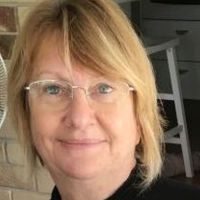 Diane Ware
Diane WareThis transcription item is now locked to you for editing. To release the lock either Save your changes or Cancel.
This lock will be automatically released after 60 minutes of inactivity.